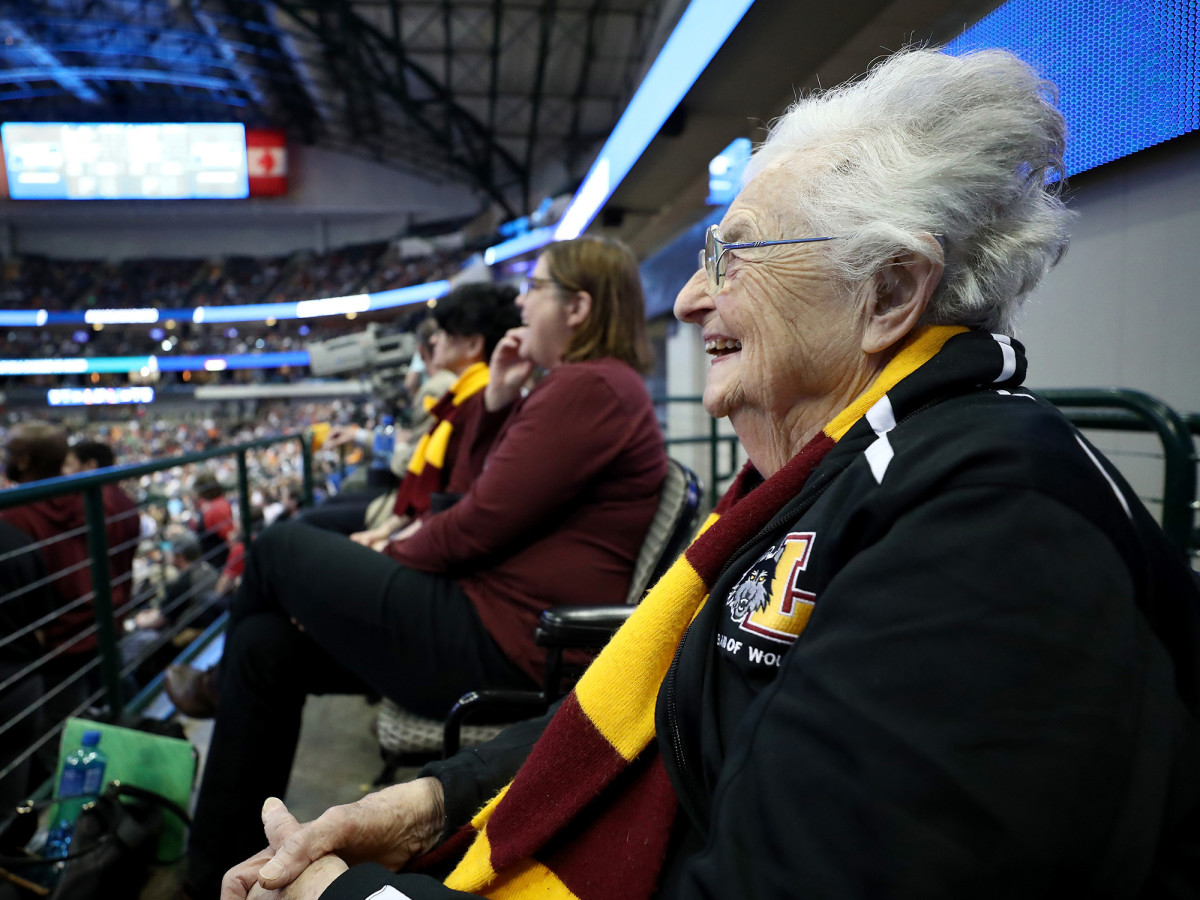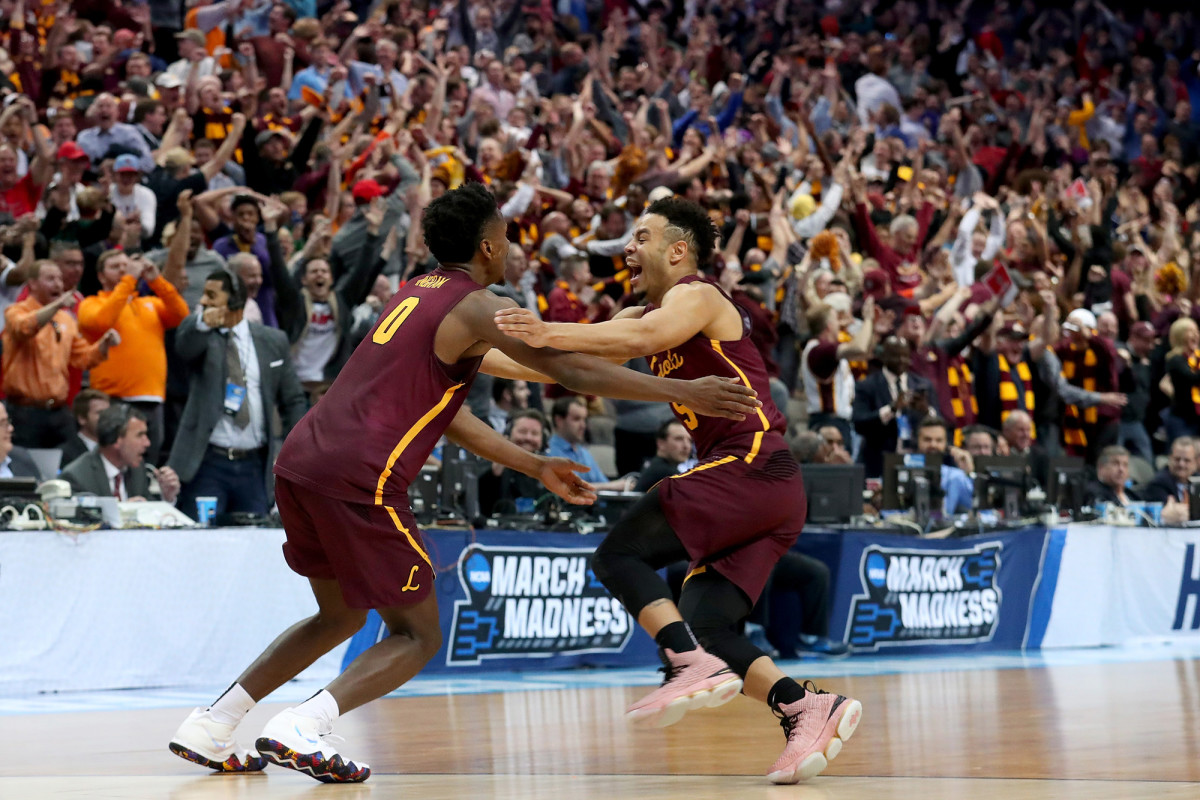Loyola-Chicago May Be Your Cinderella Team, But the Ramblers Are Not Yet Satisfied

DALLAS — The 98-year-old nun wore a maroon-and-gold scarf, and she wanted to discuss Loyola-Chicago coach Porter Moser’s late-game timeout strategy. Sister Jean Dolores-Schmidt was especially thankful Thursday that Moser had saved a timeout so he could calm his team down in the moment that followed the answered prayer.
What the Ramblers’ chief spiritual advisor didn’t know was that the last timeout almost got spent a few seconds earlier. Moser had told his players that if they grabbed a rebound following a missed free throw, they should call timeout to regroup if the bodies piled up in the lane. As Miami guard Lonnie Walker IV’s missed free throw hung on the back iron with 9.3 seconds remaining and the Ramblers down one, Loyola-Chicago guard Ben Richardson wasn’t sure what he should do if he wound up with the ball. Ramblers guard Donte Ingram leaped for the ball, but he could only tip it. That was enough to push it out of the grasp of Miami forward Sam Waardenburg. Richardson sprinted in from the free throw line to grab it away from Waardenburg. “A man’s rebound,” Ramblers center Cameron Krutwig called it as the Ramblers celebrated a 64-62 win in the locker room minutes later.
When Richardson secured the ball, he felt everyone sprinting the other direction. During the 11-day layoff between winning the Missouri Valley Conference Tournament and Loyola-Chicago’s first NCAA Tournament game in 33 years, the Ramblers had practiced this situation multiple times. If the lane is clear, forget the timeout.
Attack.
Richardson passed to guard Marques Townes, who had open floor ahead of him as the clock ticked. Townes accelerated across midcourt and darted toward the left wing. He saw three Miami defenders collapsing on him. Then he heard it.
“MAR-QUES!”
The Ramblers have something called the Wall of Culture back home in their locker room on the campus of the Jesuit university in Chicago’s Rogers Park neighborhood. The wall contains dozens of helpful phrases Moser has collected over the years. Many come from former boss Rick Majerus. These phrases include “When the ball moves, you move” and “Fake a pass to make a pass.” About halfway down and just to the right of center is: “Give a verbal.”

Generally, this means to talk on the court. Specifically, this means to speak in the most efficient manner possible to achieve the desired result. A player who is open and wants the ball shouldn’t clap, scream or say “HEY, OVER HERE.” He should yell the name of the person who has the ball.
That’s precisely what Loyola-Chicago senior Ingram did. “Loud and clear,” Townes said. “Loud and clear.” Ingram had picked himself up off the ground on the other end of the court following his tipped rebound attempt. He had trailed the break. He had settled on the far left edge of the March Madness logo that adorns midcourt at the American Airlines Center, about five feet from the top of the key. He yelled his roommate’s name, and then the ball came.
He rose and released the ball.
“Please God,” Sister Jean asked her boss. “Let him make it.”
“When he shot it, I knew it was going in,” Ingram’s father Don said. “I knew it. I knew it.”
MARCH. MADNESS. MAGIC. 😱#MarchMadness pic.twitter.com/1jKMTUIBkD
— NCAA March Madness (@MarchMadnessMBB) March 15, 2018
And after the ball sailed through the net and the buzzer blared?
“Thank you Jesus,” Don Ingram said. “Thank you.”
“God is good,” Moser said.
What dad does when his son hits a buzzer beater in the Big Dance. pic.twitter.com/VLaLxTYBzI
— Andy Staples (@Andy_Staples) March 15, 2018
But the game wasn’t over. That’s why Sister Jean was so glad Moser had that timeout saved. The officials put three-tenths of a second back on the clock. Moser called that timeout and settled the Ramblers. Miami’s only chance was a tip-in or a Ramblers foul that put the Hurricanes on the line. (This is covered on the Wall of Culture by, “Time & Score.”) Loyola-Chicago players wouldn’t cheat themselves out of a 12th consecutive win with a silly mistake. The Hurricanes threw the ball in. The lights flashed. The buzzer blared again.
Now it was time for a second celebration that seemed more subdued than the first, when Townes had chased Ingram the length of the court and jumped on him. By the time the Ramblers reached the locker room, they were tempering the whimsy of the last-second win with reminders that third-seeded Tennessee awaits on Saturday.

Still, it wasn’t lost on Ingram that he’ll be enshrined in a One Shining Moment montage. For the rest of his life, he’ll be the guy who sank the shot that lifted the Ramblers. “I think a lot of us blacked out,” Ingram said. “It’s still a crazy feeling now. You grow up as a kid seeing those moments. For me to be a part of it, it’s unreal.”
It’s also important. When Moser took over the program in 2011, local players ignored his program. Guard Milton Doyle, who finished his college career last year and now plays in the G League, was the first Chicago recruit to sign with Moser. Ingram, out of Simeon High, was the second. He helped lay the groundwork for other locals including freshmen Krutwig (Algonquin, Ill.) and Lucas Williamson (Chicago).
“How apropos that it’s a Chicago kid to make that shot,” Moser said.
It happened just like Sister Jean drew it up in her mind as she watched Townes dribble down the court. If Ingram got it, he’d make it. In the stands, Don Ingram felt the same way. “He just let it go,” the elder Ingram said. “It was pure.”
Watch: Loyola Fans Go Wild In Chicago Bar After Donte Ingram's Game-Winner Over Miami
And, for the moment, it’s over. Donte Ingram will have that shot for the rest of his life, but he’ll put it out of his mind for the immediate future. The Ramblers might be your Cinderella, but they didn’t consider themselves underdogs against Miami on Thursday and they won’t feel that way Saturday against Tennessee. “We’re not content,” Donte Ingram said. “We have this motto, no finish line. We can win any game we’re put in.”
Just ask the lady who was born 29 years after James Naismith invented the game.
“Be careful, Tennessee,” Sister Jean said.
